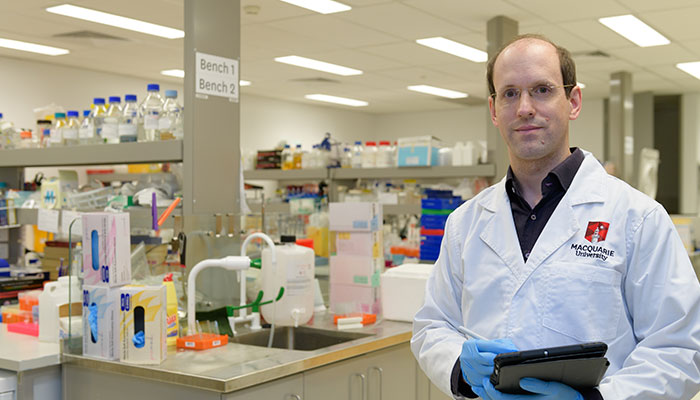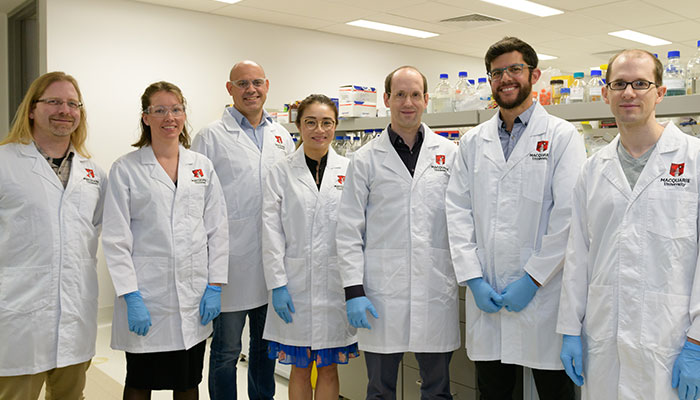There’s a lot we don’t know about dementia, even though it’s Australia’s second leading cause of death.

Hope: Professor Lars Ittner, who has spent 15 years working on unravelling the mysteries of dementia, feels his goal of developing effective drug therapies is now achievable thanks to the team assembled at the new Dementia Research Centre.
But Professor Lars Ittner says, for the first time in over 15 years of working to develop drugs for this debilitating disease, effective therapies are now within his grasp.
“I’ve spent the last fifteen years trying to understand the underlying mechanisms of Alzheimer’s disease, because it’s crucial that you understand how a disease works before you try to develop treatments,” Professor Ittner says.
“We've developed a large portfolio of potential targets now. This has crystallised for me over the last two years or so, and I’m ready to take the next step and develop these into therapies,” he says.
“We have developed 3D brains in a cellular culture model, which is a new way to test early versions of drugs to see what impact they have on the disease
Professor Ittner is the leader of Macquarie’s new Dementia Research Centre, where he heads a team of nearly 40 researchers on a heroic quest: to find treatments that will slow or ameliorate the symptoms of dementia.
Professor Ittner has brought his research partners from his previous role at the University of NSW with him, and recruited widely to gather a crack team who are already immersing themselves in their mammoth task.
“It was very clear to me that this work could only be done through a huge team effort, just me and my small team was just not enough to achieve what we wanted to do,” he says.
He says that Macquarie was an obvious choice because of its existing network of neuroscience research.
Brain in a Dish
Professor Ittner says that for at least the next five years, the Centre will focus on pre-clinical dementia research and drug development. The Centre has seven different teams specialising in very different aspects of research, from genome editing to chemistry to new cellular models of disease.
Dementia is a multi-faceted disease, he adds, and any treatments are likely to involve a combination of drugs that treat different aspects of the disease.

Pioneering minds: leading lights in dementia research, left to right, Professor Thomas Fath, Dr Janet van Eersel, Dr Fabien Delerue, Associate Professor Yazi Ke, Professor Lars Ittner, Dr Adam Martin and Dr Arne Ittner.
“We have developed 3D brains in a cellular culture model, which is a new way to test early versions of drugs to see what impact they have on the disease,” he says.
It’s not a living brain, he is quick to add – this is not his Frankenstein moment.
The model that the team has developed uses cell cultures of tissues from donor organisms , and grows them on a three-dimensional matrix. “The tissue isn’t in a living organism, but it is as complex,” he says.
“We call it ‘brain in a dish,’” he says. “We take cells from different environments and put them together to create an artificial brain-like network.”
There are now some claims that there may be potential for blood tests, and that would be the ultimate goal
The team has come up with this testing concept themselves, but Professor Ittner is reluctant to claim their research as a world-first.
“Competition in our field is fierce - and that’s really good,” he says. “I’m sure there are many laboratories in similar pursuit, in fact when you’re the only ones doing something, I often think you are more likely to be on the wrong track!”
Diagnosing dementia
Professor Ittner’s research into a large study of dementia cases that were confirmed after death found that more than a third had been wrongly diagnosed.
“About 30 to 40 per cent of the clinical diagnoses of dementia were incorrect,” he says.
The main types of dementia - Alzheimer’s, vascular, Lewy Body or fronto-temporal dementia – can be difficult to distinguish using just behavioural symptoms, he adds.
“Accurate diagnosis of dementia is only possible after death,” he says. “We have to look at a cross-section of the brain to be sure of the type of dementia.”
In fact, he adds, it’s quite impressive that around 70 per cent of cases are correctly diagnosed without having a reliable diagnostic tool.
- Anxious wait cut to 48 hours at new, o ne-stop breast cancer clinic
- Do mobile phones affect your sleep?
“These different dementia diseases are due to different processes in the brain,” he says. “So finding better diagnosis tools is really important. Our search for drug treatments will address specific processes in the brain, so we will need to know what the process is in each particular patient.”
His team is working on better ways to use imaging of the brain to confirm diagnoses, he says.
“There are now some claims that there may be potential for blood tests, and that would be the ultimate goal,” he says.
The DRC is working to find a trace molecule that could distinguish certain types of dementia, he adds.
Translating from research to therapies long-term
Professor Ittner says that it will be a good few years before this research translates into therapies.
“Right now, we don’t work with living humans, because this is not really how drug development is done,” he says.
He is hopeful that within the next decade, the Centre will be at a stage where it can work with patients on clinical trials.
“Our centre is very focused on supporting young researchers, providing them with interdisciplinary and multidisciplinary structures where they can work to build the solutions to this huge challenge,” he says.
The Dementia Research Centre is in for the long haul, he adds - and he believes the key to solving one of the largest challenges of old age lies in the hands of young scientists.
“Our leadership team is relatively young compared to other centres, we have people here that are on the upward trajectory and they are hungry to find solutions.”
Note: Your gift will not be diminished by administrative costs - 100% of your donation goes towards your chosen cause.


